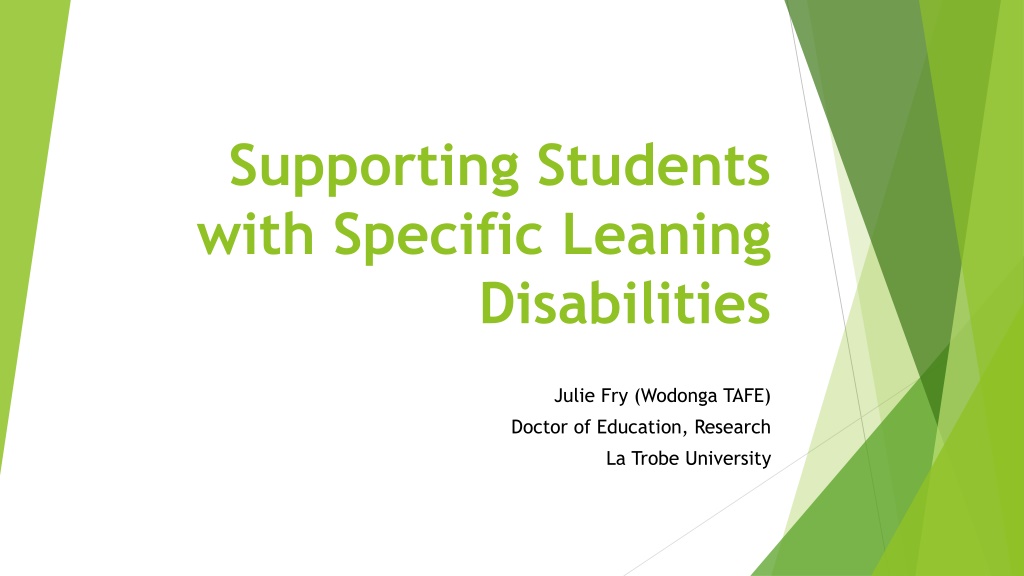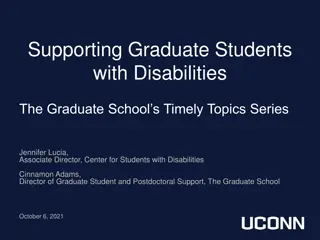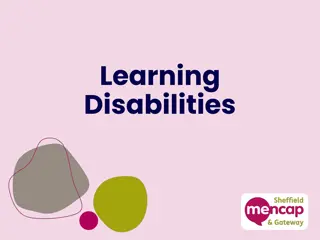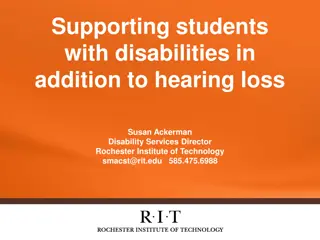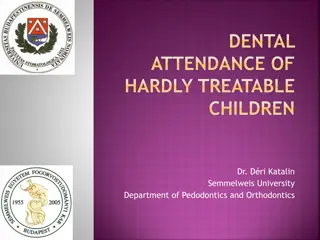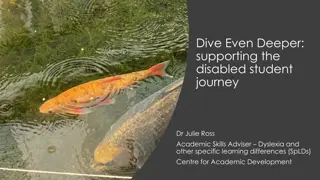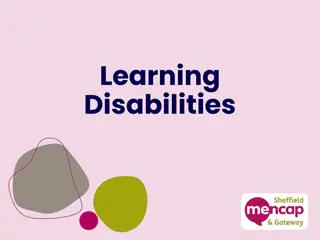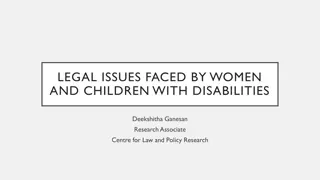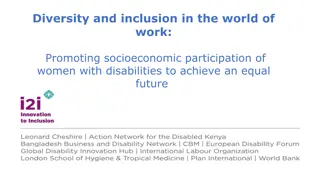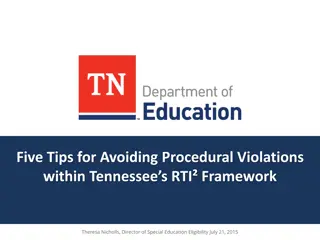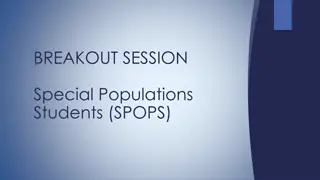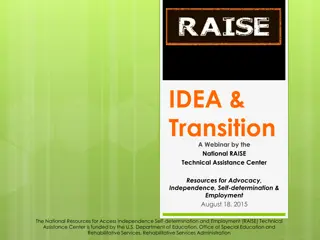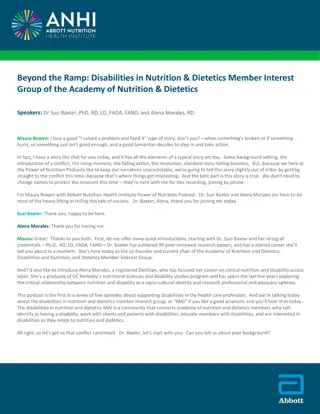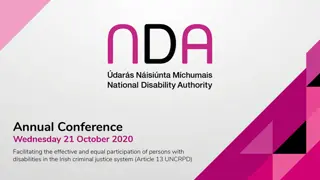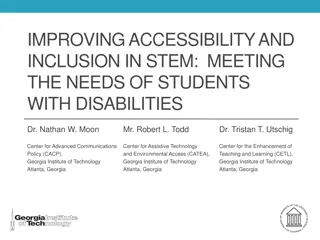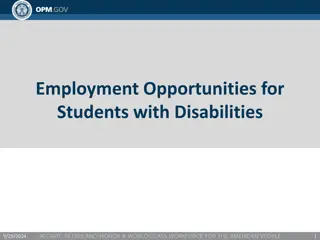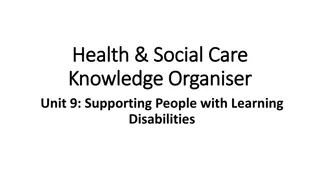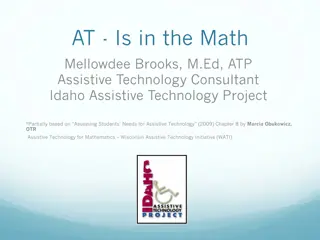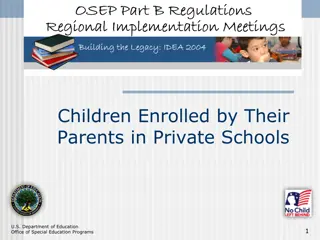Supporting Students with Specific Learning Disabilities: Research Overview
Julie Fry from Wodonga TAFE explores the importance of supporting students with specific learning disabilities in the Australian context. Highlighting the historical development of disability legislation, she emphasizes the profound influence of the education system on individuals with disabilities. The research delves into defining disabilities, the lived experience of individuals, and the impact on academic and social development. By focusing on good practices in tertiary education, the study aims to promote universal models of support for students with learning disabilities across various education sectors.
Download Presentation

Please find below an Image/Link to download the presentation.
The content on the website is provided AS IS for your information and personal use only. It may not be sold, licensed, or shared on other websites without obtaining consent from the author. Download presentation by click this link. If you encounter any issues during the download, it is possible that the publisher has removed the file from their server.
E N D
Presentation Transcript
Supporting Students with Specific Leaning Disabilities Julie Fry (Wodonga TAFE) Doctor of Education, Research La Trobe University
Presentation Overview 80 % of SLD A bit about me Why this research Importance of the findings The universal model of practice Where to from here
Australian Context Under study internationally since the 1800 s One in ten people (internationally) Recognised in Disability and Equity Legislation & Education Acts: 1973 - Schools in Australia (Karmel Report) 1976 - Select Committee on Specific Learning Difficulties 1992 Introduction of DDA 2002 - Inquiry into the Education of Students with Disabilities 2004 - National Inquiry into the Teaching of Literacy 2010 - Helping People with Dyslexia: a National Action Agenda 2014 Round Table Discussion Minister Pyne US UK Canada Australian Governments have been challenged since the 1960 s by national and international lobby groups and associations to enforce disability legislation across education sectors.
Setting the Scene The lived experience Life consequences Australia s system When life goes wrong for a dyslexic at school, it has a knock- on effect to life after school, thus the influence of school is profound. At school there are two curriculums: academic and social, failure in either or both will have lifelong effect on the individual (Alexander-Passe, 2009, p. 267).
The definition of "disability" in the DDA includes: Specific Learning Disabilities Physical Intellectual Psychiatric Sensory A disorder or malfunction that results in the person learning differently from a person without the disorder or malfunction Neurological, and Learning disabilities, as well as Physical disfigurement, and The presence in the body of disease- causing organisms. Australian Human Rights Commission (2014)
Why this research focus 20 + years experience across Tertiary Education. Good practice is occurring and it is having a life changing impact. This practice has evolved in a difficult and complex context ambiguous definitions / low levels of acceptance nationally, no educational policy or precedence. What does it look like is it universal / can it be taught / can other education sectors learn from the tertiary education experience, knowledge and skills?
Tools of the Relational Person Centred Strength Based Solution Focused Rights Based Trade Universal Design Inclusive Practice Access and Personalised Learning Equity Personalised Learner at the Centre Information Technology Lifelong process Collaborative Communities Sustainable Solutions Self Management Self Advocacy Future Focussed Life Skills Transformation Professional Growth Evidence Based Reflective Systemic change Adapted from Abby & Baylis (2012)
Underpinning Practice Principles Person at the Centre Human Rights Strength Based Future Focused (goal oriented) Solution Focused Sustainable life beyond education Universal Design Transparency - Information
Written by Benny Aged 11 years Only I can understand how it feels to read in front of my classmates and be terrified to make a mistake. Only I can understand the reason why it takes forever to read a book when my classmates take a week. Only I can understand the words I write on the paper that no one else can read. Only I can understand what it is like to read a question when the words jump around the page. Only I can understand what it is like to work for hours when other kids work for 30 minutes. Only I can understand ridiculous puzzles, absurd equations, extreme math, and the meaning of science because my brain sees things in a different way. Only I can understand what it feels like to be judged for needing help. Kids who need help are not dumb but only I can understand. I can understand because I am Dyslexic. Because I am dyslexic I can understand a lot of things that only I can understand.
